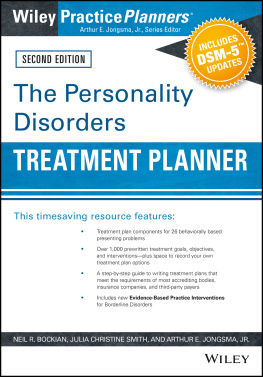First published 2011 by Transaction Publishers
Published 2017 by Routledge
2 Park Square, Milton Park, Abingdon, Oxon OX14 4RN
711 Third Avenue, New York, NY 10017, USA
Routledge is an imprint of the Taylor & Francis Group, an informa business
Copyright 2011 by Taylor & Francis.
All rights reserved. No part of this book may be reprinted or reproduced or utilised in any form or by any electronic, mechanical, or other means, now known or hereafter invented, including photocopying and recording, or in any information storage or retrieval system, without permission in writing from the publishers.
Notice:
Product or corporate names may be trademarks or registered trademarks, and are used only for identification and explanation without intent to infringe.
Library of Congress Catalog Number: 2010024005
Library of Congress Cataloging-in-Publication Data
Johnson, Sandra J., 1967-
Assertive community treatment : evidence-based practice or managed recovery / Sandra J. Johnson.
p. ; cm.
Includes bibliographical references and index.
ISBN 978-1-4128-1494-2 (alk. paper)
1. Community mental health services--United States.
2. Evidence-based psychiatry--United States. 3. Mental illness--Treatment--United States. I. Title.
[DNLM: 1. Community Mental Health Services--United States.
2. Evidence-Based Practice--United States. 3. Mental Disorders--therapy--United States. WM 30 J675a 2010]
RA790.6.J58 2010
362.204250973--dc22
2010024005
ISBN 13: 978-1-4128-1494-2 (hbk)
I would like to thank the numerous (anonymous) respondents who participated in this research and those participants who provided essential suggestions and corrections based on their own experiences in the field of mental health, consumer activism, and law.
In its pilot program thirty years ago at the Mendota Mental Health Institute, Madison, Wisconsin, the original Assertive Community Treatment team was set up by clinicians and researchers during the era of deinstitutionalization.1 With the widespread release of persons with mental disabilities into community settings during the 1970s and 1980s, the policy of deinstitutionalization in the American mental health care delivery system created tremendous change at both the micro and macro levels of mental health care. Supporters of deinstitutionalization assumed federal dollars were constructing community treatment facilities and failed to acknowledge that the local mental health centers located within the communities were not prepared for the number of individuals requiring their services.
Originally developed as a response to deinstitutionalization, ACT teams consist of members from the fields of psychiatry, nursing, and social work, as well as professionals with other types of expertise, such as substance abuse treatment and vocational rehabilitation. These teams are required to meet specific staff credentials and maintain low caseloads of only ten ACT clients to one staff member.2 After receiving a comprehensive assessment, each client is provided whatever services he or she requires: medication, housing, food and clothing, substance abuse treatment, and/or support. Additionally, ACT strives to lessen or eliminate the debilitating symptoms of mental illness every individual client experiences and to minimize or prevent recurrent acute episodes of the illness. ACT also seeks to enhance each clients quality of life, improve functioning in adult social and employment roles, promote independence, and alleviate the clients familys burden of providing care.
Unlike other community-based programs, ACT is not a case management program that connects individuals to mental health, housing, or rehabilitation agencies. Case managers perform specific functions and benefits, such as coordinating referrals and services with other health care providers, arranging special services, coordinating benefit claims, and so on. In comparison, ACTs multidisciplinary team provides these highly individualized and personalized services in community settings directly to consumers who are at high risk for psychiatric hospitalization, homelessness, criminal justice system involvement, and/or use of illegal substances.
Achieving Consistently Positive Outcomes and the Concept of Recovery
Because it is an evidence-based practice, the adoption and implementation of ACT3 promises to enhance the well-being of those individuals suffering from severe mental illness. Evidence-based practices are clinical and administrative practices that have been shown through research to produce specific results consistently and that have demonstrated efficacy and cost-effectiveness in securing positive outcomes for individuals with severe and persistent mental illness. The components that enable these programs to provide consistent results must also be replicable using measurable standards. As a result, achieving consistently positive outcomes is at the heart of the definition of an evidence-based practice.4
The notion of recovery has also emerged as an especially compelling and powerful paradigm for supporting individuals with serious mental illnesses,5 one that envisions that severely mentally ill individuals will actively self-manage their illnesses by taking responsibility for their lives, making decisions about their services, and achieving independence. As the authors of Policy Implications for Implementing Evidence-Based Practices note, quality and accountability have become watchwords of mental health services:
Implementing evidence-based practices has become a means to achieving both ends. In this context quality means positive outcomes obtained by using cost-effective services, and accountability means documentation of adherence to evidence-based practice.6
The implementation of well-researched evidence-based programs is rapidly becoming standard practice nationwide and is required by most funding sources. In an era of managed care that encourages state mental health administrators to adopt policy that increasingly relies on programs that can measure the outcomes of care provided, evidence-based practices have come to center of the quality care agenda. With the development of criterion-based methods for evaluating the fidelity of ACT and their importance in states transitioning ACT to Medicaid reimbursement, this strong reliance on traditional scientific-based knowledge virtually forces mental health providers to refer specifically to ACT in order to receive Medicaid funding. Doing so allows states to depend increasingly on Medicaid to save money by obtaining a federal match for services previously covered solely by the state general funds. In addition, policymakers concentrate on how and why numbers exist (i.e., the number of hospitalization and/or jail days) in order to define policy problems by providing some method of measurement. The ACT models recovery-oriented mission, therefore, is jeopardized due to Medicaids inflexibility in taking into account the programs unique behavioral health treatment services and Medicaids strong medical orientation that limits the range of services clients may receive.
Paradoxically, new programs must be science-orientedevidence-basedin order to receive Medicaid approval, but successfully implementing ACT and its recovery-oriented goals emphasizing responsibility and independence proves problematic if not impossible under Medicaids guidelines. Using Medicaid as a financing tool for behavioral health programs serves to restrict program flexibility, inevitably curtailing and stifling the very policy innovations the program originally claimed to provide. Additionally, the mental health system is unable to attract the highly educated, experienced staff the models researchers and state policymakers assume are available. As a result, ACT has come to represent a cost-savings driven program, not a consumer-oriented program advocated by the researchers, policymakers, and state officials who promote the program nationwide.







